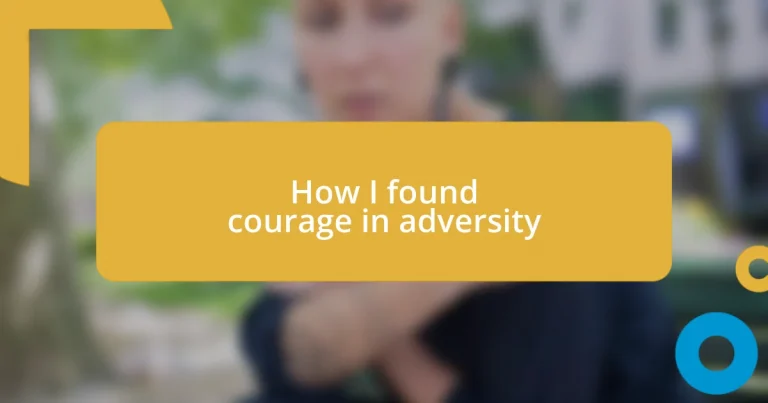Key takeaways:
- Adversity can be reframed as a source of growth, allowing individuals to discover resilience and support from others.
- Recognizing and confronting personal fears through self-reflection empowers individuals to take actionable steps towards overcoming challenges.
- Celebrating small victories fosters resilience and self-compassion, reinforcing the understanding that every step forward is significant in the journey of courage.
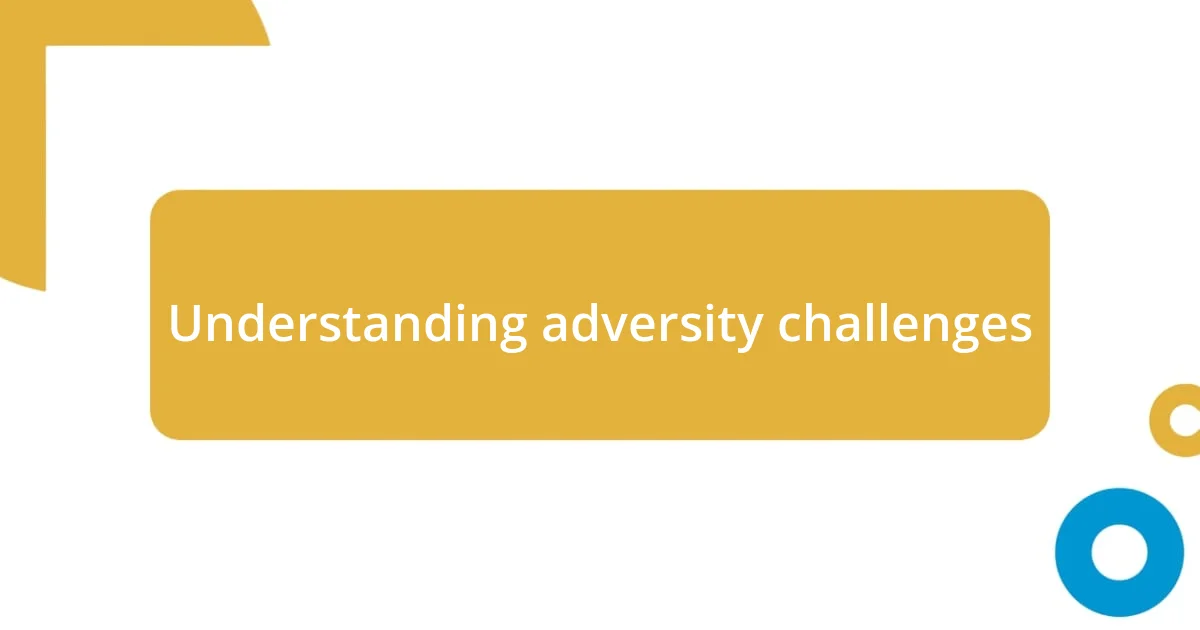
Understanding adversity challenges
Adversity challenges come in many forms, often striking when we least expect them. I remember when I faced a significant setback in my career; suddenly, everything I worked for felt threatened. In that moment, I had to ask myself, “What can I learn from this?”
These challenges can often feel isolating, like you’re the only one navigating through the storm. I once felt completely overwhelmed, believing I was spiraling down a path with no return. But reflecting on those tough days, I realized they sculpted my resilience and opened my eyes to the support around me.
Embracing adversity requires a shift in perspective. Instead of viewing setbacks solely as failures, I learned to see them as stepping stones towards growth. Have you ever reconsidered a challenge and found unexpected strength within it? It’s a powerful realization that those hard moments can become our greatest teachers.
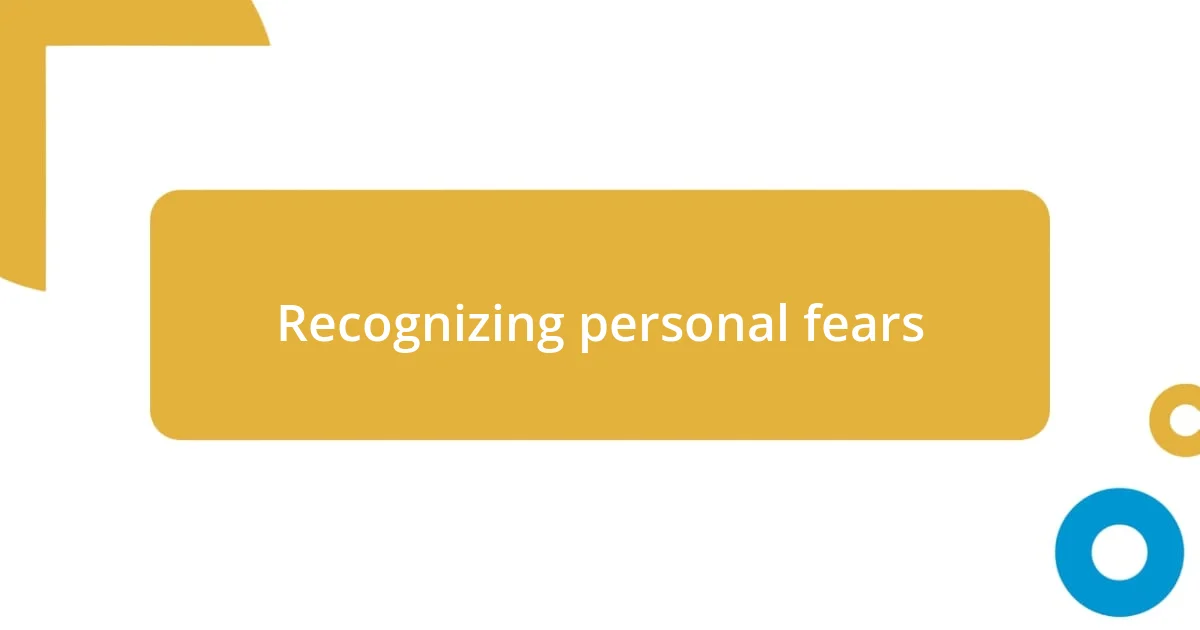
Recognizing personal fears
Recognizing personal fears can be a daunting task, but it’s crucial for personal growth. I recall a time when I was about to speak publicly for the first time. The fear of judgment and failure washed over me, making my palms sweaty and my heart race. But as I delved into that fear, I discovered it stemmed from my desire for acceptance and perfection—a realization that changed how I approached challenges.
When I finally sat down and actually listed out my fears on paper, something remarkable happened. I realized that many of them were baseless or exaggerated. This exercise not only demystified my anxieties but also empowered me to confront them head-on. By understanding that my fears were simply thoughts, not facts, I found the courage to take small steps towards overcoming them.
The process of recognizing fears often involves uncomfortable self-reflection. I remember vividly how unraveling my fear of failure led me to embrace opportunities that I would have otherwise avoided. It felt like shedding a heavy coat; the freedom I gained was exhilarating. How many of us let fear dictate our choices? Acknowledging these fears is not only the first step in overcoming them; it’s a leap toward a more fulfilling life.
| Type of Fear | Example |
|---|---|
| Fear of Judgment | Worrying about what others think during a presentation |
| Fear of Failure | Avoiding taking on new projects due to past experiences |
| Fear of Rejection | Not expressing feelings because of potential negative responses |
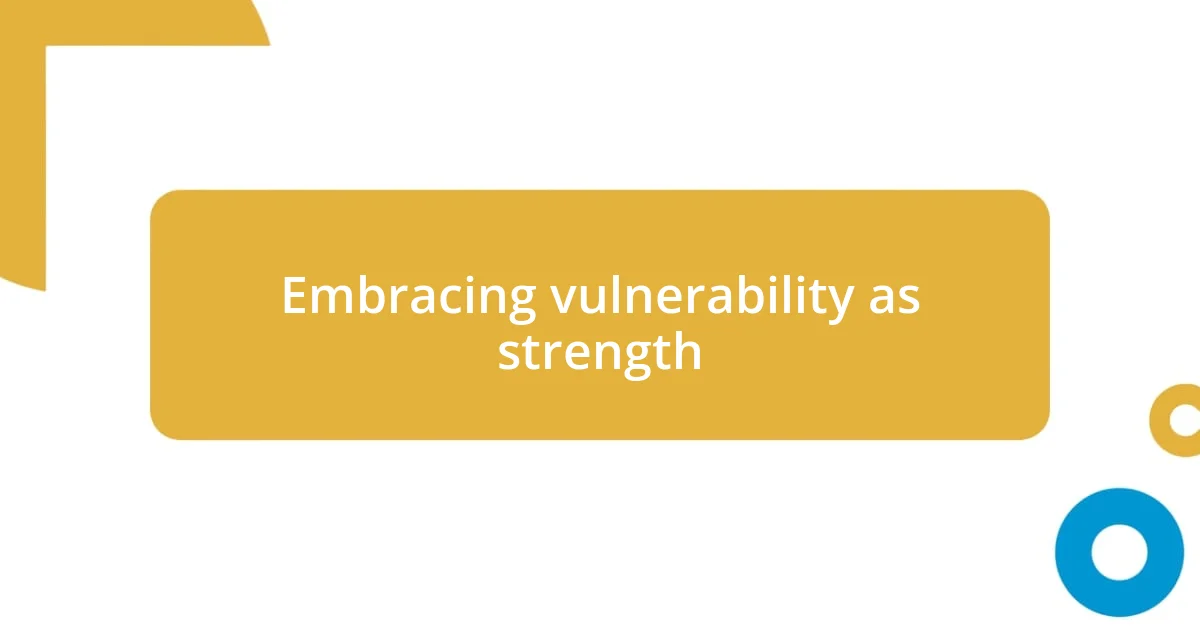
Embracing vulnerability as strength
Embracing vulnerability can be a transformative experience. I vividly remember the first time I shared my struggles in a group setting; my heart raced and I felt exposed. Yet, when I let my guard down, I discovered that so many others felt the same way. It was in that moment of being vulnerable that I realized sharing my truth was not a sign of weakness, but a bridge to deeper connections and understanding.
Consider this list of ways vulnerability can manifest as strength:
- Authentic Connections: Opening up invites others to do the same, fostering genuine relationships.
- Self-Acceptance: Accepting my flaws helped me grow rather than hide from them.
- Courage to Grow: Vulnerability encourages me to step outside my comfort zone, challenging me to learn and embrace new experiences.
- Empathy for Others: When I acknowledge my struggles, I’m more understanding of others’ challenges, building a compassionate community.
Each time I face my fears and embrace vulnerability, I find not just strength within myself, but a deeper connection to those around me that propels us all forward.
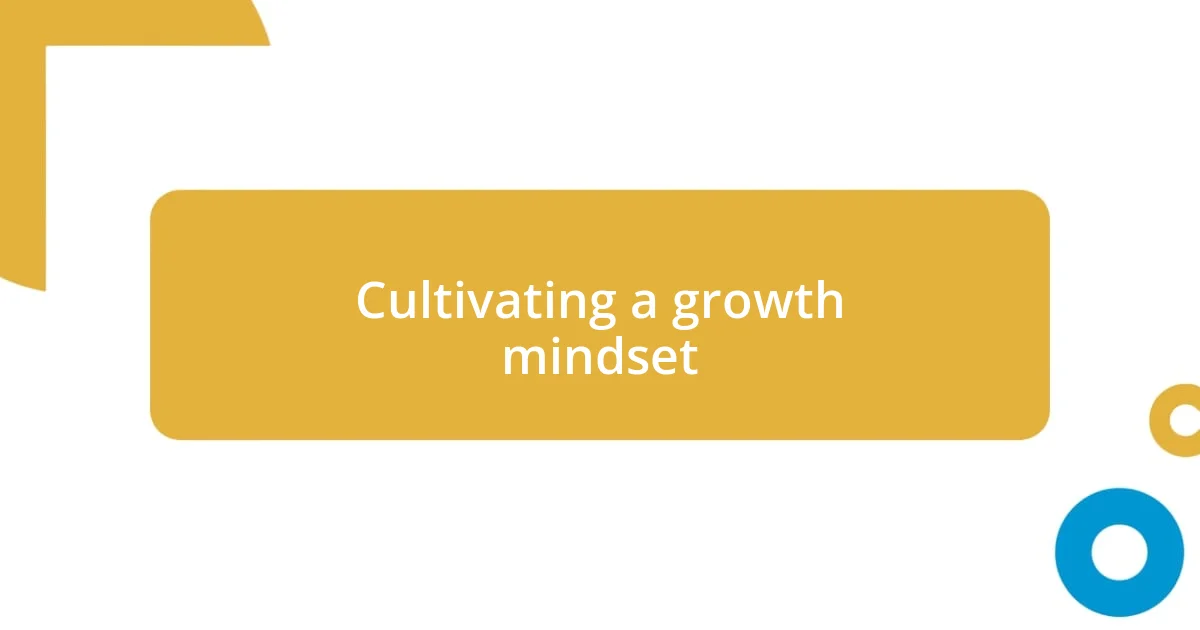
Cultivating a growth mindset
Cultivating a growth mindset starts with viewing challenges as opportunities rather than obstacles. I remember a particularly difficult period when I faced numerous setbacks in my career. Instead of succumbing to frustration, I began to ask myself, “What can I learn from this?” This simple shift in perspective opened my mind to new possibilities and creative solutions, transforming my setbacks into stepping stones.
Taking risks can be intimidating, but I’ve found that each small step leads to unexpected growth. For instance, when I decided to take a course outside my expertise, I initially felt out of my depth. Yet, this sense of unease sparked curiosity and excitement. Embracing the discomfort was essential in broadening my skillset and reinforcing the idea that growth often lies just outside the comfort zone.
Practicing self-compassion plays a vital role in developing a growth mindset. There were moments I faltered and felt like giving up, but instead of criticizing myself, I practiced kindness. I’d remind myself that every expert was once a beginner. This gentle approach not only nurtured my resilience but also inspired me to keep pushing forward. Have you considered how being kinder to yourself could unlock your potential?
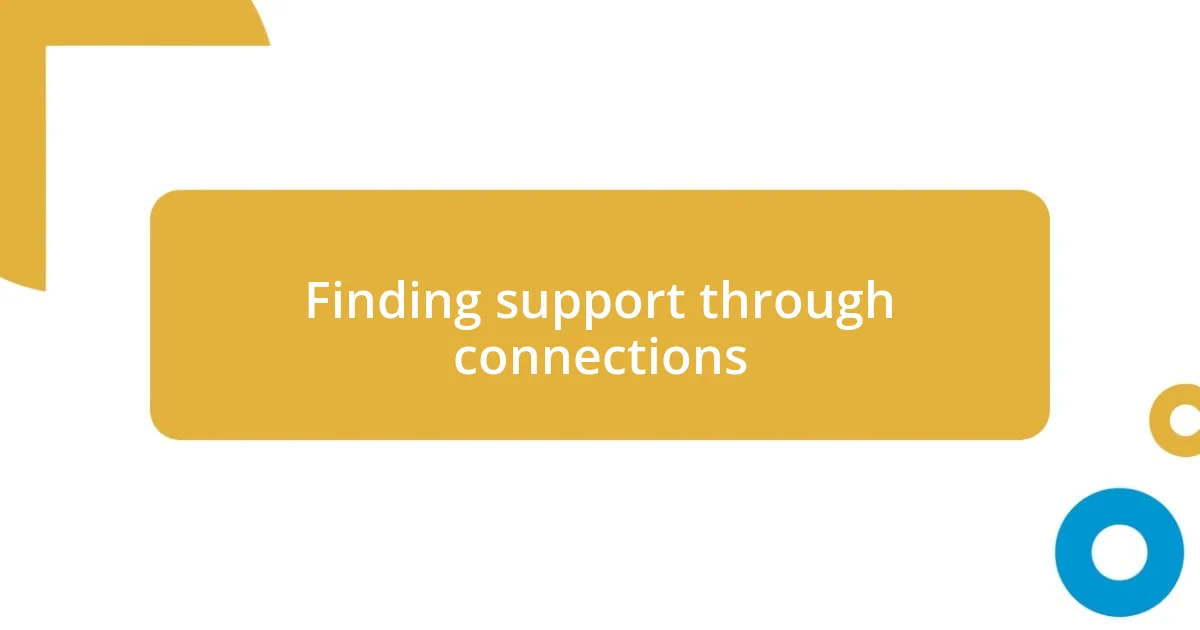
Finding support through connections
Building connections during tough times often feels like a lifeline. I remember reaching out to an old friend when I hit a particularly rough patch. It was eye-opening to hear that my vulnerability sparked similar feelings in her, and, together, we supported each other through our struggles. Have you ever found that a simple conversation can lighten the burden of your challenges?
Engaging in community activities has also been pivotal for me. Joining a local support group transformed my experience. It was comforting to be surrounded by people who understood my journey. Sharing experiences not only helped me to feel less isolated but also reinforced that strength is often found in unity. Isn’t it remarkable how a shared experience can cultivate resilience?
I’ve learned that creating meaningful connections extends beyond just seeking support; it’s about offering it too. When I reached out to someone needing encouragement, I discovered that helping others also fueled my own courage. This two-way connection deepened my relationships and reinforced the idea that we are stronger together. How often do you think about the dual power of giving and receiving support?
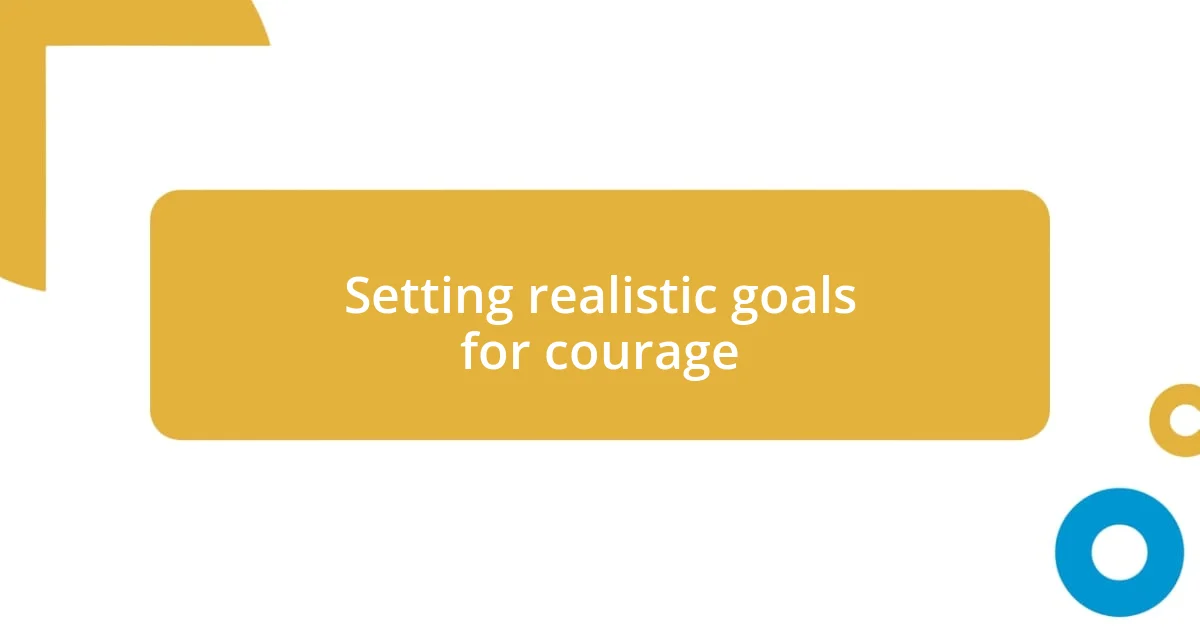
Setting realistic goals for courage
Setting realistic goals for courage is crucial in navigating through challenging times. I remember setting a small goal for myself during a particularly overwhelming phase. Instead of taking on everything at once, I chose to focus on the simplest task: getting out of bed and going for a short walk each day. This tiny shift gave me a sense of accomplishment and gradually built my confidence to tackle bigger challenges. Have you ever noticed how small victories can create a ripple effect in your life?
When it comes to courage, I’ve found that breaking down larger goals into bite-sized pieces makes them much more attainable. For instance, I aimed to give a presentation at work, which initially felt daunting. So, I divided that goal into manageable steps: first, researching the topic, then creating an outline, and finally rehearsing it in front of a friend. Each mini-goal was a success in its own right, boosting my courage with every step. How do you structure your goals to keep yourself motivated?
I believe that celebrating small milestones is just as important as achieving the larger objective. After completing my presentation, I treated myself to a new book that had been on my wish list. This little celebration grounded my experience and reinforced the idea that courage is a journey, not a destination. Have you thought about how rewarding it feels to recognize your progress, no matter how small? Embracing these realistic goals cultivates enduring courage, reminding us that every step forward counts.
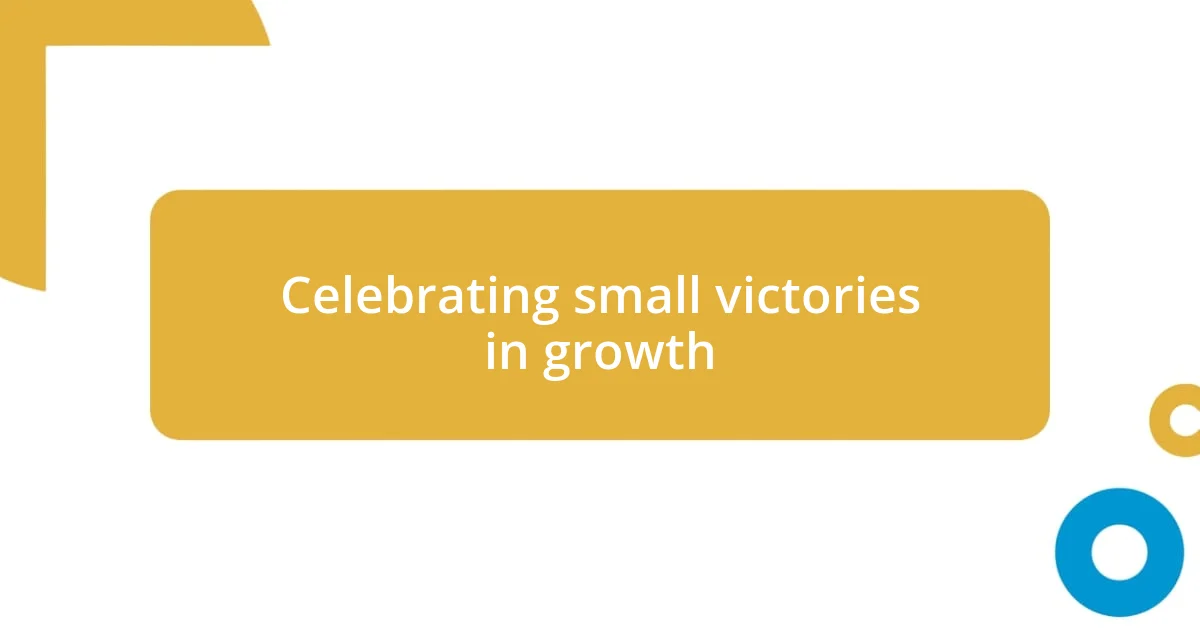
Celebrating small victories in growth
In my journey of growth, I’ve found immense value in celebrating small victories, no matter how tiny they may seem. For instance, I once set an ambitious goal to volunteer regularly, but my initial stride was simply signing up for one local event. That first step felt monumental to me, and the overwhelming sense of pride that followed energised my spirit immensely. Have you ever experienced that rush of joy from accomplishing something that initially felt daunting?
Reflecting on those small wins, I’ve learned that they play a pivotal role in building resilience. I vividly recall a day when I managed to reach out to a colleague for support, which had been a challenge for me. Just that small act of vulnerability led to a fruitful discussion that unveiled new ways to tackle my challenges. Doesn’t it feel powerful to realize that even the slightest action can create a significant shift in our mindset?
It’s easy to overlook these moments amidst the chaos of life. I remember celebrating one particularly overwhelming week by treating myself to a favorite coffee shop treat after successfully completing a daunting work project. That simple joy turned into a reminder that every achievement, big or small, deserves recognition. How often do you take a moment to acknowledge your progress? By appreciating these little victories, I’ve cultivated a sense of self-compassion that fuels my growth in adversity.












